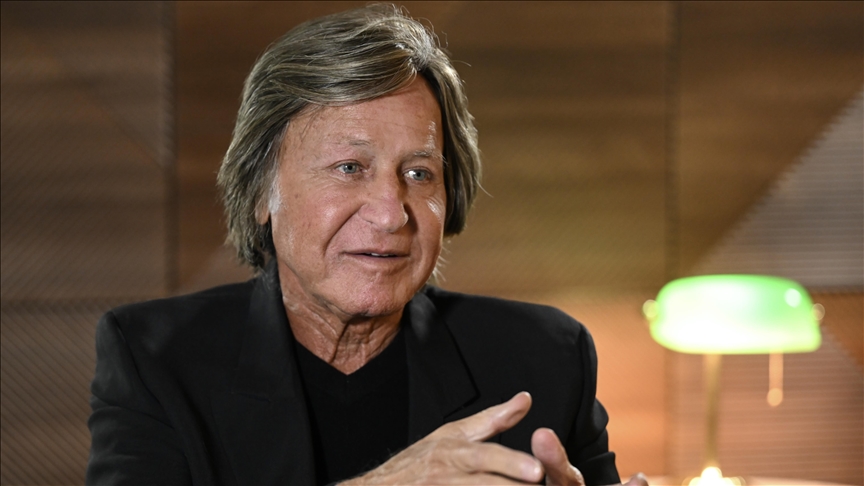Mohamed Hadid, father of famed models, sees parallels between 1948 Nakba and modern-day Gaza
'Nobody should be subjected to a pain that prevents them from returning to and they were born and raised, whether in life or death' Mohamed Hadid tells Anadolu
 Mohamed Hadid, American realtor of Palestinian origin and the father of world famous models Gigi and Bella Hadid, speaks to Anadolu during an exclusive interview in New York, United States- Photo: Fatih Aktas-AA
Mohamed Hadid, American realtor of Palestinian origin and the father of world famous models Gigi and Bella Hadid, speaks to Anadolu during an exclusive interview in New York, United States- Photo: Fatih Aktas-AA
NEW YORK
Mohamed Hadid -- the father of internationally renowned Palestinian-American models Bella and Gigi Hadid -- said when he saw Palestinians fleeing to the southern part of Gaza due to Israel's occupation, he felt as if his mother's experiences 75 years ago were vividly replaying in his mind, in an exclusive interview with Anadolu.
"I don't remember anything since I was only nine days old. But what I saw on the screen deeply affected me and made me feel the struggle my mother went through and the difficulties she faced to get me to a refugee camp alive," Hadid, a Palestinian-born businessman, said.
Born in Nazareth in the northern region of Galilee during the first Israel-Palestine War in 1948, Mohamed Hadid described how Jewish groups began seizing Palestinian lands during that time.
Hadid said that his father also hosted two Jewish families escaping from Europe, who arrived at the Haifa Port by ship from Poland and Hungary in their home in Safed, and his mother went to Nazareth to give birth to him two years later, during World War II.
He mentioned that when he was a newborn, his mother, along with his two-year-old sister, returned to their home in Safed, which was nearly taken over by Jewish settlers.
"When I was only nine days old, my mother, taking my two-year-old sister with her, returned to our home in Safed. Safed had almost been taken over by the Jewish residents there. My father, a professor at Haifa University, was also not at home. When we arrived at the part of our home that belonged to my mother and our family, they did not let us in," he said.
Hadid recalled that his mother, realizing they were now refugees, attempted to take a blanket from the house so her children would not be cold on the road. Still, the Jewish family did not allow them inside, not permitting her to take the photo album.
Hadid also said that he and his father reunited with his mother and siblings at the refugee camp in Syria after several days.
Social media posts by the Hadid sisters
"My children follow their instincts about nature and what happens to people in the world. They have contributed to these issues for years, from the earthquake disaster in Türkiye to famine in Africa, homelessness in Southeast Asia, and building schools for UNICEF. There has always been an interest in humanitarian situations among them. They are half-Palestinian because I am Palestinian. This naturally creates an interest in them about this issue," Hadid said, referring to his famous model daughters' current social media posts.
Hadid also mentioned the numerous threats and hate emails that the family has received that the family.
"We are receiving numerous threats. I am receiving many hate emails. Our phone numbers, mine and my daughters', have been shared online. We have received various calls ranging from hateful death threats to potential attacks. We had to change our phone numbers," he said.
Antisemitism is West-origin
Discussing antisemitism, Hadid highlighted that antisemitism originated in Europe, affecting the people of the region.
"This happened both in Eastern Europe and the West, towards the people of our region. But I cannot be anti-Semitic; I come from the Semitic race myself. I come from the lands where Jesus Christ was born. I cannot be against myself," he added.
He underscored that Jews and Palestinians are cousins as descendants of Abraham, and while they may have different perspectives, they cannot be enemies.
"Three religions came together in these lands. Therefore, we cannot be against them, and they cannot be against us," he said.
Hadid further added that one of the world's greatest sorrows is people not being able to return to the land where they were born, dead or alive.
"Nobody should be subjected to a pain that prevents them from returning to the land they were born and raised, whether in life or death," he said.
Despite his parents and grandmother wishing to be buried in their birthplaces, Hadid said that this was not possible for them due to being displaced as refugees.
He also shared the story of his grandmother, who couldn't be buried in Palestine after her death on the island of Rhodes during their time there.
"This was the closest we could get her to Palestine," he said.
Hadid also said that he had to bury his parents in the US, adding: "I would also like to be buried in the lands where I was born.
*Writing by Esra Tekin in Istanbul
Anadolu Agency website contains only a portion of the news stories offered to subscribers in the AA News Broadcasting System (HAS), and in summarized form. Please contact us for subscription options.







